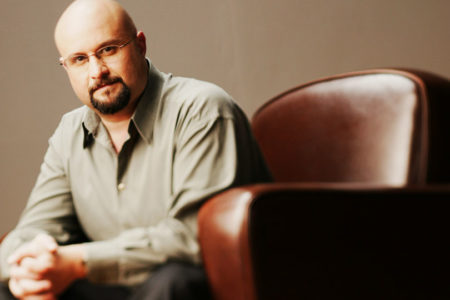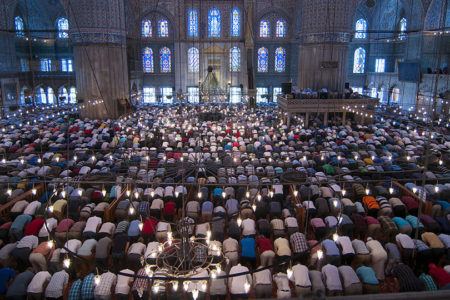Serving in God’s Spirit
Zechariah 4:1–14
The official seal for the State of Israel was unveiled on February 10, 1949. It consists of a seven-branched menorah (lampstand/ candelabra) with an olive branch on either side. Opposite the entrance to the Israeli Knesset (parliament) stands a great menorah with branches that reach 16 feet high and 13 feet wide. This particular menorah is decorated with figures highlighting Israel’s history and engraved with the Scripture, “not by might, nor by power, but by my Spirit, saith the Lᴏʀᴅ of hosts.”
The menorah, olive branches, and inscription are symbols of the rebirth of the State—a graphic reminder and witness of God’s power and promise to preserve the Jewish people.
The inspiration for both Israel’s seal and the inscription on the giant menorah was taken from Zechariah’s fifth vision in chapter 4. These same symbols that inspired modern-day Israel were first used centuries earlier to inspire Zerubbabel to finish construction of the second Temple.
Zechariah’s Revelation
Zechariah began his fifth vision by relaying the revelation he received from the interpreting angel:
And the angel who talked with me came again, and waked me, as a man that is wakened out of his sleep, and said unto me, What seest thou? And I said, I have looked and, behold, a lampstand all of gold,with a bowl upon the top of it,and its seven lamps on it, and seven pipes to the seven lamps, which are upon the top of it, and two olive trees by it, one upon the right side of the bowl, and the other upon the left side of it (vv. 1–3).
Most likely Zechariah was not asleep as we know it but in a state of spiritual exhaustion or trauma, overwhelmed by the previous four visions that had come to him in quick succession (cf. Dan. 10:8-9).
When the interpreting angel asked Zechariah what he saw, the prophet answered, “a lampstand all of gold” (v. 2). Zechariah described a lampstand that was entirely different from the one standing in the Tabernacle. First, he saw a “bowl [container] upon the top” of it filled with olive oil that flowed to seven lamps. Second, the container had seven tubes connected to each lamp. In Hebrew the text “seven pipes to the seven lamps” reads “seven and seven,” meaning seven pipes were connected to each lamp, making a total of 49 tubes, which allowed oil to flow directly to the lamp without the assistance of a priest. Third, an olive tree is pictured on each side of the lampstand, supplying oil directly to the container through “two golden pipes” (v.12). The olive oil is described as “golden oil,” or yellow in color (v. 12).
The lampstand provided light in the holy place so the priest could see as he ministered. A lighted lampstand also represents the nation of Israel as the Lord’s chosen witness to bring spiritual light to a world living in pagan darkness.
Zechariah asked the interpreting angel, “What are these, my lord?” (v. 4).
The angel answered the question with a question: “Knowest thou not what these are?”
Zechariah responded, “No, my lord” (v. 5). The angel’s question intimated that Zechariah, who was a priest as well as prophet, should have understood what he saw. The question is not answered until the end of the chapter.
Zerubbabel Rebuilds
The angel continued to give Zechariah further revelation: “This is the word of the Lᴏʀᴅ unto Zerubbabel, saying, Not by might, nor by power; but by my Spirit, saith the Lᴏʀᴅ of hosts” (v. 6). Zerubbabel, who had laid the foundation of the second Temple 16 years earlier, was assured he would complete the task, but not by might (human strength, wisdom, wealth, or military force) or by any human power. The insurmountable difficulties in completing the construction could be overcome only by the power of God’s Spirit. A finished Temple would provide irrefutable evidence to Zechariah and Zerubbabel that God’s Spirit alone accomplished the task, not Israel.
The angel revealed that Zerubbabel would face great obstacles and opposition:
Who art thou, O great mountain? Before Zerubbabel thou shalt become a plain; and he shall bring forth the headstone of it with shoutings, crying, Grace, grace unto it (v. 7).
The word who is used to personify the phrase great mountain, which is a metaphor for the obstacles and opposition that confronted Zerubbabel. He started to rebuild the Temple after the Jewish remnant had returned to Jerusalem (cf. Ezra 3:8), and he immediately faced what seemed to be insurmountable problems.
Gentiles living in the land tried to stop the Temple reconstruction in three ways. (See Ezra 4:1-24.) First they wanted to help with the task but were rejected because they did not follow the God of Israel. Making an ungodly alliance with these people would have diverted Israel and weakened the Jewish nation’s resolve to finish the project.
Then those Gentiles tried to discourage and intimidate the workers by hiring counselors to frustrate construction. Finally, those opposing the project wrote letters of complaint to King Artaxerxes, petitioning him to shut down the project. Nevertheless, this seeming mountain of opposition would “become a plain,” or be leveled by the Lord, so Zerubbabel’s Temple could be expeditiously completed.
And it was completed when Zerubbabel capped it off with a “headstone” (v. 7). This was not the foundation stone laid 16 years earlier. It was the “top stone,” or last stone, put in place to complete the Temple. When Zerubbabel set the headstone in place, shouts of “grace, grace unto it” (v. 7) could be heard echoing throughout Jerusalem. The word grace can be interpreted as a request for God to bless the worship place with His favor; or it could be interpreted as the people praising God for His favor in restoring the beautiful Temple for Israel.
Zechariah’s confidence in the Temple’s completion received a boost by an encouraging word of assurance from the interpreting angel. The prophet wrote,
Moreover, the word of the Lᴏʀᴅ came unto me, saying, The hands of Zerubbabel have laid the foundation of this house; his hands shall also finish it, and thou shalt know that the Lᴏʀᴅ of hosts hath sent me unto you (vv. 8–9).
These verses are not a repeat of verse 7 but an emphatic announcement that what Zerubbabel had begun, he would finish. This encouragement came from the “Lᴏʀᴅ of hosts” (Jehovah of armies), a phrase used by the post-exilic prophets to describe an all-powerful God who will accomplish what He decrees.
Great hope filled the elders of Judah, who envisioned a Temple possessing the glories they had gazed on before their captivity. But as the walls went up, people’s spirits came down. Those who had not seen the grandeur of Solomon’s Temple praised the Lord. But the older generation, who lived before the destruction of Solomon’s Temple, wept loudly and profusely because Zerubbabel’s Temple was nothing in comparison to Solomon’s. They scorned the new structure as insignificant compared to the first Temple because it was small and plain.
Zechariah silenced the critics with a word from God: “For who hath despised the day of small things?” (v. 10). The Lord rebuked those who scorned. Nothing God has commissioned to be built for His glory should be considered insignificant. God often uses so-called small people and places to accomplish great projects.
As the Temple went up, the nation’s attitude changed from one of criticism to rejoicing. Zechariah wrote,
For they shall rejoice, and shall see the plummet [plumb line] in the hand of Zerubbabel with those seven; they are the eyes of the Lᴏʀᴅ, which run to and fro through the whole earth (v. 10).
The plumb line in Zerubbabel’s hand was to assure proper alignment of the stones as Temple construction moved speedily ahead. While Zerubbabel worked, the Lord watched “with those seven,” that is, “the eyes of the Lᴏʀᴅ, which run to and fro through the whole earth” (v. 10, cf. 3:9).
Nothing is hidden from God’s infinite intelligence and omniscience. The Lord’s eyes scrutinize the world. He providentially watches over and cares for Israel against its enemies and will accomplish His sovereign program for the Jewish people. God had commissioned the Temple’s construction, and no one had a right to despise it.
Zechariah’s message greatly encouraged both Zerubbabel and the Jewish remnant, both of whom were equipped and sustained by God’s Spirit to finish building the second Temple. Zerubbabel completed the work four years later in 516 .C. (Ezra 6:15).
Zechariah’s Response
Zechariah, excited about the revelation he had received and knowing his question about the olive trees in verse 4 had not been answered, quickly responded with one question and then another:
What are these two olive trees upon the right side of the lamps/and and upon the left side of it? … What are these two olive branches [literally, ears of olives, a cluster of olives] which, through the two golden pipes, empty the golden oil out of themselves? (vv. 11-12; cf. v. 3).
Again, the angel answered Zechariah’s question with a question: “Knowest thou not what these are?”
Zechariah responded again, “No, my lord” (v. 13).
Then the angel revealed, “These are the two anointed ones, that stand by the Lord of the whole earth” (v. 14). The word these refers to the two branches of the oil tree (v. 12) and, indirectly, to tl1e two olive trees (v. 11). The two are “anointed sons” (literally, sons of oil), or channels through which oil flows.
Anointing oil was used to consecrate high priests and kings; it was poured over their heads to symbolize their being endowed with God’s Spirit.
Though not stated, Zerubbabel (the civil leader) and Joshua (the high priest) represent the two anointed ones who “stand by the Lord of the whole earth.” Zerubbabel, a descendant of King David, and Joshua are anointed servants chosen by the Lord to head the nation and represent Israel before Him.
They also prefigure the two witnesses in Revelation 11:4 who are described as olive trees and lampstands, filled with the Holy Spirit as the witnesses of Christ during the Tribulation, shortly before He returns to Earth.
The lampstand, together with Zerubbabel and Joshua, prefigures Jesus the Messiah, who will function as the Messianic King-Priest at His Second Coming. He will be the light of a godly Temple in the Millennium, reign and rule as King-Priest, and bring blessing through a redeemed Israel as Lord and Light to the nations of the world.
The prophet’s message is an encouragement to believers today. Everyone serving the Lord needs the anointing power of the Holy Spirit. His servants should never despise small beginnings when the Lord is in them. God is sovereign over the earth, and His prophetic program will succeed and accomplish what He has divinely decreed. Truly, it is neither by might, nor by power, but by the Spirit of God that a servant accomplishes the Lord’s work.








Hello: The seven lamps of fire in Revelation 4:5, is there a parallel to Genesis 15:7 “A lamp of fire passed between the pieces” ? …..Thank you, Rodger Lemley.